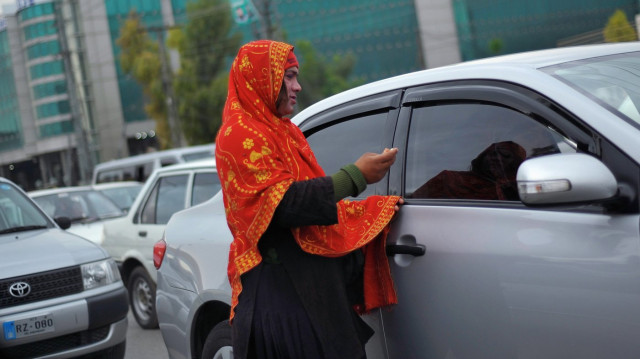The unsuspecting transmitters of HIV in Peshawar
Nearly 30% of transgenders in Dalazak Road neighbourhood are HIV-positive

A transgender woman begs for alms from motorists at a traffic stop in Rawalpindi, outside Islamabad, Pakistan, on March 27. PHOTO: NPR
Peshawar’s Dalazak Road neighborhood shares some sleazy commonalities with Pattaya. Its streets, Iqbal Plaza and Asia Plaza, adjacent to Pir Abdullah Shah Market, have earned a citywide notoriety. Reason: sex workers who belong to the transgender community to be precise.
Hundreds of transgenders live in the cold, dingy labyrinthine of the two plazas. But the scary thing is nearly 30% of them are said to be infected with HIV. And still scarier is the fact that they are transmitting the deadly infection to their unsuspecting teenage ‘clients’.
Disease control: 50 students get scholarships for AIDS research
“Around 300 transgenders live here and at least 30% of them are HIV positive. I know 10 to 15 workers only in these five, six rooms who are infected. But the number in both plazas is much higher,” claims R*, the community’s guru at Iqbal Plaza.

While applying a thick layer of cheap makeup on her face, R* says that two years ago an awareness session was organised by the Khyber-Pakhtunkhwa health department with the help of a transgender activist but after that no one cared to pay a follow-up visit.
Unfortunately, the ‘clientele’ are mostly teenagers, aged somewhere between 13 and 20. The daytime is for ‘clients’, while in the evening these workers perform lewd dances at wedding parties and other functions.
“The teenagers who can afford to spend only Rs30 to Rs50 would never spend as many bucks on contraceptives,” says R* while broaching the subject of precaution against sexually transmitted diseases (STDs) and sexually transmitted infections (STIs).
Most of the transgenders living in the neighbourhood are not even aware of precautionary measures to protect themselves against STDs and STIs. “I’m not aware of any precautionary measures,” says sex worker A*.
No HIV-AIDS testing camps have been organised yet by the national or provincial AIDS control programmes that can check the spread of the deadly infection.
Data collected from the provincial AIDS control programme shows that in the whole province the total number of registered HIV positive patients is 2,643.
Strangely, when people of this community are becoming carriers of HIV in the whole province, there are only 58 transgender patients registered with the health department of Khyber-Pakhtunkhwa.
Assistant Director Public Health Dr Attaullah, who has been working with the AIDS control programme for the last two years, admits that no awareness or testing camp has been arranged so far to create public awareness about the risks of contracting HIV.
He says the government has allocated Rs500 million for different health programmes. Of this, around Rs335 million are for the control of HIV/AIDS. However, he doesn’t have an answer to the question if any action has been taken yet.
Spike in HIV/AIDS cases: Over two dozen blood banks sealed
Apart from the provincial health department being negligent to the risk of transgender transmitting HIV, the community is also reluctant to go through screening because after being declared HIV positive their community abandons them, as they did with D*, a transgender who died in September this year due to AIDs and tuberculosis in Hayatabad Medical Complex. Tellingly, D* also belonged to Iqbal Plaza.
Director Aids Control Programme of Khyber-Pakhtunkhwa Ayub Roz says that the project has been dormant for the past two years due to lack of staff. Neither the federal nor provincial government has shown any interest in eradicating the disease by creating awareness among the communities. “Now, the government has allocated Rs335 million which has not been released though. The department is hiring staff now.”
Shopkeepers and residents of the neighbourhood complain about the role of policemen who allow young men to come in the area after taking bribe.
SP City Gul Nawaz says the police provide security but if policemen are involved in such activities, then strict action will be taken against them.
*Names have been withheld to protect the privacy and identity of the people involved .
Published in The Express Tribune, November 29th, 2016.













COMMENTS
Comments are moderated and generally will be posted if they are on-topic and not abusive.
For more information, please see our Comments FAQ